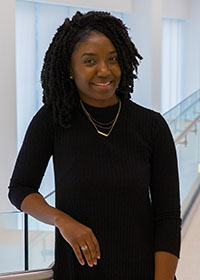Constance Owens speaks on her summer fellowship with the Agency for Healthcare Research and Quality (AHRQ) and her passion for health care equity.
Constance Owens is a PhD student in Health Services Research. Recently, she has been accepted into a virtual summer fellowship with the Agency for Research and Quality’s (AHRQ) Center for Evidence and Practice Improvement on profiling practice-based research networks (PBRNs). PBRNs are groups of primary clinicians and practices working together to improve the quality of health care through community-based research.
“A major focus of the research is to examine the role PBRNs have played in response to the COVID-19 pandemic,” says Owens on the fellowship which begins in July. “The research seeks to understand strategies to increase access to digital health interventions for vulnerable populations, during the pandemic.”
For Owens, the fellowship is an unparalleled opportunity to conduct applied research, something she plans to do for her dissertation. AHRQ’s investment in promoting equitable access to health care across the nation’s health care system is another reason that drove her to apply.
“I believe the diversity in my research skills and professional experiences, coupled with my aspirations in health services research really helped me stand out in my interviews,” Owens answers on the application process. She also credits her experience at Mason, which has allowed her to apply the program’s interdisciplinary research to a real-world setting that seeks to address health care inequity.

“Throughout my PhD journey, I found that it is so important to always reaffirm your purpose by asking yourself, ‘How will my research be a catalyst for meaningful change in our nation’s health?’”
In her PhD program, Owens has conducted quantitative and qualitative studies related to health care access disparities and social determinants of health in vulnerable populations. She presented her work at the American Public Health Association Conference and has used this research to promote health equity throughout underserved communities.
Furthermore, she’s conducted research at Mason in collaboration with other PhD students. Together they developed a quantitative study for HAP 819 that explored the risks of e-cigarette smoking on respiratory conditions among women of childbearing age. They received the 2019 Award for Scientific Merit for the study at the College of Health and Human Services Celebration of Scholarship Conference.
Prior to coming to Mason for her PhD program, she was employed by The Lewin Group, a federal contractor with the Centers of Medicare and Medicaid Services. Her work supported national innovation models that fostered learning and diffusion of value-based care.
“Mason’s investments to cultivate innovative ideas of all students, in any field of study, was key in my decision to pursue my PhD at Mason,” she says, noting that there’s a need for increased diversity in the decision-making processes on health care in this country. Additionally, Owens was drawn to the PhD program in Health Services Research because of its interdisciplinary curriculum and the opportunity to work with nationally recognized faculty with a range of expertise in the field.
“Health equity has been a foundational component of my research throughout the PhD program,” adds Owens on the focus of on the program. “I expect to finish in 2022.”
After completing her degree, her aim is continuing health service research by advancing health equity for youth and families. Owen hopes to use her research to mentor future health care professionals and foster opportunities to support the professional development of both undergraduate and graduate students.
“Throughout my PhD journey, I found that it is so important to always reaffirm your purpose by asking yourself, ‘How will my research be a catalyst for meaningful change in our nation’s health?’” answers Owens when asked about advice for potential HAP PhD students. “I highly recommend that all potential HAP PhD students take the time to ask themselves this same question in order to thrive in [their] purpose to advance our nation’s health.
